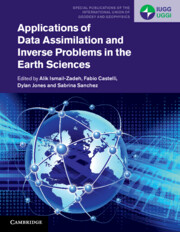Book contents
- Applications of Data Assimilation and Inverse Problems in the Earth Sciences
- Series page
- Applications of Data Assimilation and Inverse Problems in the Earth Sciences
- Copyright page
- Contents
- Contributors
- Preface
- Acknowledgements
- Part I Introduction
- 1 Inverse Problems and Data Assimilation in Earth Sciences
- 2 Emerging Directions in Geophysical Inversion
- 3 A Tutorial on Bayesian Data Assimilation
- 4 Third-Order Sensitivity Analysis, Uncertainty Quantification, Data Assimilation, Forward and Inverse Predictive Modelling for Large-Scale Systems
- Part II ‘Fluid’ Earth Applications: From the Surface to the Space
- Part III ‘Solid’ Earth Applications: From the Surface to the Core
- Index
- References
1 - Inverse Problems and Data Assimilation in Earth Sciences
from Part I - Introduction
Published online by Cambridge University Press: 20 June 2023
- Applications of Data Assimilation and Inverse Problems in the Earth Sciences
- Series page
- Applications of Data Assimilation and Inverse Problems in the Earth Sciences
- Copyright page
- Contents
- Contributors
- Preface
- Acknowledgements
- Part I Introduction
- 1 Inverse Problems and Data Assimilation in Earth Sciences
- 2 Emerging Directions in Geophysical Inversion
- 3 A Tutorial on Bayesian Data Assimilation
- 4 Third-Order Sensitivity Analysis, Uncertainty Quantification, Data Assimilation, Forward and Inverse Predictive Modelling for Large-Scale Systems
- Part II ‘Fluid’ Earth Applications: From the Surface to the Space
- Part III ‘Solid’ Earth Applications: From the Surface to the Core
- Index
- References
Summary
Abstract: We introduce direct and inverse problems, which describe dynamical processes causing change in the Earth system and its space environment. A well-posedness of the problems is defined in the sense of Hadamard and in the sense of Tikhonov, and it is linked to the existence, uniqueness, and stability of the problem solution. Some examples of ill- and well-posed problems are considered. Basic knowledge and approaches in data assimilation and solving inverse problems are discussed along with errors and uncertainties in data and model parameters as well as sensitivities of model results. Finally, we briefly review the book’s chapters which present state-of-the-art knowledge in data assimilation and geophysical inversions and applications in many disciplines of the Earth sciences: from the Earth’s core to the near-Earth environment.
Information
- Type
- Chapter
- Information
- Publisher: Cambridge University PressPrint publication year: 2023
